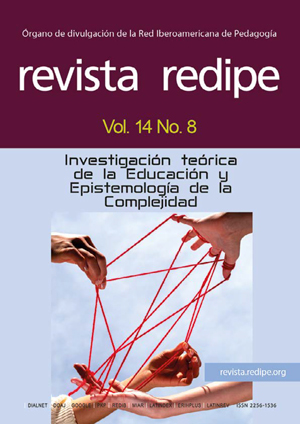Historical evolution of the disciplinary conception towards an epistemology of the complexity of natural sciencies and environmental education
Main Article Content
Keywords
Complexity, Transdisciplinary, Anthropocentrism, Natural sciences, Environmental education, Paradigm
Abstract
This article aims to examine the historical rupture represented by Descartes’ work in constructing the project of modernity, which replaced a centuries-old worldview based on geocentrism and theocentrism—a perspective that remains valid and even hegemonic today. Additionally, it traces how Morin offers an alternative approach to classical science by breaking Cartesian paradigms and embracing the uncertainty of complexity. While complexity provides no ready-made solutions, it facilitates learning through practice. Morin’s method serves as a pathway for interpreting environmental issues from the standpoint of environmental education, potentially becoming a tool to understand the planetary ecosystem crisis, humanity’s role in it, and possible solutions.
References
Ausubel. D. (2002). Adquisición y retención del conocimiento. Una perspectiva cognitiva. 2ª edición, Barcelona: Paidós Ibérica.
Carson, R. (1964). Primavera silenciosa: Libros de la naturaleza. Barcelona: Editor Luis de Carolt
Delgado, C. (2011). Hacia un nuevo saber. La bioética en la revolución contemporánea del saber. La Habana: Acuario.
Derrida, J. (1997). Una filosofía deconstructiva. Zona erógena, 35. Disponible en:
Ereú De Mantilla, E. (2021). Fundamentos epistemológicos de la educación ambiental desde el antropocentrismo y el biocentrismo. Revista AMBIENTIS OCCIDENTALES /Volumen 03 / EneroJunio 2021: 62-70
Eschenhagen, M. (2021). Colonialidad del saber – educación ambiental: la necesidad de diálogos de saberes. Praxis & Saber, 12(28), e11601. https:// doi.org/10.19053/22160159.v12. n28.2021.11601
Eschenhagen, L. (2015). El fracaso del desarrollo sostenible: la necesidad de buscar alternativas al desarrollo, algunas entradas. ESPAÇO, POLÍTICAS PÚBLICAS E TERRITÓRIO: Reflexões a partir da América do Sul (Primera Ed, pp. 72–102). Recife: Editora UFPE.
FAO (2020). Pon fin a la pérdida y el desperdicio de alimentos. Por las personas. Por el planeta. Roma, Italia. Recuperado de: http://www.fao.org/publications/card/ es/c/CB0641ES
Fals Borda, O. (1981) La Ciencia y el Pueblo en Investigación Participativa y Praxis Rural. Lima. Moxa Azul Editores.
Feuerstein, R. (1990). The theory of structural cognitive modifiability. In B.Presseisen (Ed.), Learning and Thinking Styles: Classroom Interaction. Washington, DC: National Education Association.
Fonseca De Pineda, M. E. (2018). Complejidad, Transdisciplinariedad y Transcomplejidad. Revista Scientific. Vol. 3, Nº 9 - Agosto-Octubre 2018 - pág. 337/347. https://doi. org/10.29394/Scientific.issn.2542- 2987.2018.3.9.18.337-347
Freire, P. (1985): Pedagogía del oprimido. Montevideo, Tierra Nueva. Siglo XXI Editores.
García Rodríguez, J. F. (2018). APREHENSIÓN TEÓRICA DE LOS PROBLEMAS DEL HOMBRE DESDE EL PENSAMIENTO COMPLEJO Y LA TRANSDISCIPLINARIEDAD En: Investigar desde el pensamiento complejo. Multiversidad mundo real. Ciudad de México. www. multiversidadreal.edu.mx www. edgarmorinmultiversidad.org
García, R. (2006). Sistemas complejos: conceptos, métodos y fundamentación epistemológica de la investigación interdisciplinaria. España. Editorial Gedisa.



